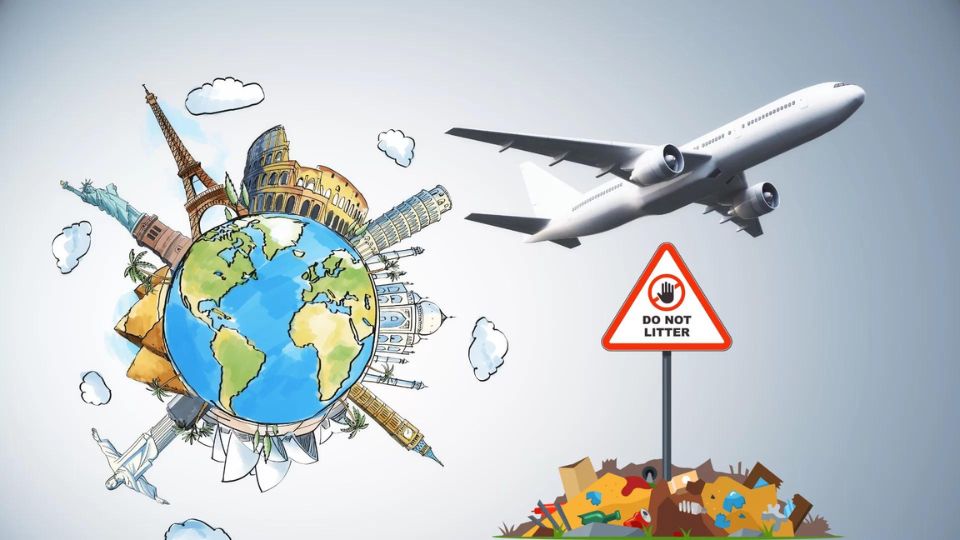
Tourism in the UK brings significant economic benefits, driving job creation, supporting local businesses, and fueling economic growth.
However, it is crucial to address the environmental challenges that accompany this thriving industry. Efforts to reduce food waste, manage litter effectively, and optimise energy consumption are vital for sustaining the natural beauty and preserving the long-term prosperity of the UK.
The economic advantages of tourism in the UK are undeniable. The country’s rich cultural heritage, historical landmarks, and stunning landscapes attract a steady stream of visitors, injecting revenue into local economies.
However, it is imperative to align this economic growth with responsible practices that minimise food waste. The hospitality sector, including hotels and restaurants, can actively contribute to reducing food waste through measures like donation programmes and composting initiatives.
By managing surplus food effectively, the tourism industry can make significant strides in reducing its environmental footprint and supporting broader efforts to combat food waste in the UK.

Maintaining cleanliness and managing waste are essential to preserve the natural allure of the UK’s landscapes and protect its delicate ecosystems.
High-traffic tourist destinations, coastal areas, and national parks are particularly vulnerable to litter accumulation.
To address this challenge, comprehensive waste management strategies are necessary. This includes the establishment of adequate waste disposal facilities, the implementation of educational campaigns promoting responsible waste management among tourists and local communities, and fostering collaboration between businesses, visitors, and relevant authorities.
By collectively striving for cleaner environments, the tourism industry can safeguard the beauty and integrity of the UK’s natural sites such as the Blackpool seaside & Scarborough.
Energy conservation and efficiency are critical components of sustainable tourism practices. As the tourism sector relies on transportation, accommodations, and recreational facilities, it is essential to minimise energy consumption and transition towards renewable sources.
Read more in our blog about the problems with River Litter in the UK.

Sustainable practices to tackle tourism waste in the UK
By integrating sustainable practices into the fabric of the tourism industry, the UK can achieve a delicate balance between economic prosperity and environmental responsibility.
It’s through such measures that the country can continue to offer unique and unforgettable experiences to visitors, while safeguarding its natural treasures for future generations to enjoy.
The Impact of the COVID-19 Pandemic
The pandemic, with its temporary halt on travel and tourism activities, brought both positive and negative effects concerning tourism waste.
On one hand, the decrease in international and domestic tourism may have resulted in a temporary reduction in waste generation.
Conversely, the surge in domestic tourism and day trips might have led to increased litter in certain areas like beaches. Examining these changes helps us understand the complex relationship between the pandemic and tourism waste.
Regions Most Affected by Tourism Waste
Different regions across the UK bear varying degrees of impact from tourism waste in cities like Liverpool.
Mountainous areas such as the Lake District are becoming hot spots for tourism waste. Many visitors to these areas leave their rubbish which has an impact on local wildlife and ruins the pristine picture of the countryside.
Coastal areas, such as popular beach destinations, often face significant litter accumulation due to the influx of tourists.
Furthermore, heavily visited national parks and areas of outstanding natural beauty also experience a considerable burden of waste.
By identifying these hotspots, targeted measures can be implemented to address the challenges faced by specific regions.
Preventing Tourism Waste
To mitigate tourism waste, proactive measures must be taken at various levels. This includes raising awareness among tourists about the importance of responsible waste management, promoting sustainable practices within the tourism industry, and ensuring the availability of adequate waste disposal facilities.
Collaboration between local authorities, tourism organisations, businesses, and visitors is crucial in preventing the accumulation of waste and fostering a culture of responsible tourism.
Environmental Implications of Tourism Waste
Tourism waste poses significant environmental risks, impacting ecosystems, wildlife, and natural resources. Littered items such as plastics, packaging, and food waste can degrade landscapes, pollute water bodies, and harm wildlife through ingestion or entanglement.
The long-term consequences of this waste threaten the fragile balance of the UK’s diverse ecosystems and jeopardise the natural beauty that attracts tourists in the first place.
Fate of Tourism Waste in the UK
The management and disposal of tourism waste in the UK involve a multifaceted approach. Waste management infrastructure, including recycling facilities and waste collection services, play a pivotal role in diverting waste from landfills.
Additionally, waste reduction and recycling initiatives are being implemented to address the challenges posed by the growing volume of tourism waste.
Main Culprits of Tourism Waste
While tourists themselves contribute to tourism waste generation, it is essential to recognise that waste management is a shared responsibility.
Tourism businesses, including accommodations, restaurants, and attractions, must adopt sustainable practices to minimise waste production.
The collaboration between tourists, businesses, and local communities is key to curbing the impact of tourism waste.
Campaigns to Reduce Tourism Waste
Numerous campaigns have been launched across the UK to tackle tourism waste.
These initiatives aim to raise awareness, educate tourists and locals, and promote responsible waste management practices. Through collaborative efforts, these campaigns strive to create a cleaner, more sustainable tourism industry that preserves the beauty of the UK’s natural landscapes for generations to come.
Tourism Waste Statistics In The UK
- The UK generated approximately 23.9 million tonnes of waste from tourism activities in 2019.
- The tourism sector accounted for around 4% of total waste generated in the UK in 2019. While tourism is a significant contributor to the economy, it also generates a substantial amount of waste.
- Food and beverage waste from tourism establishments in the UK reached around 3.8 million tonnes in 2019.
- Plastic waste generated by the tourism industry in the UK amounted to about 1.3 million tonnes in 2019.
- The total amount of paper and cardboard waste produced by tourism activities in the UK was approximately 1.6 million tonnes in 2019.
- The UK tourism sector generated around 5.3 million tonnes of CO2 emissions in 2019.
- The UK’s hotel sector generates over 289,000 tonnes of waste each year, with an average of 1.7 kilograms of waste per guest per night.
- The amount of waste generated by tourism in the UK increased by approximately 9% between 2010 and 2019.
- Around 1.5 million tonnes of waste generated by the UK tourism sector is sent to landfill.








